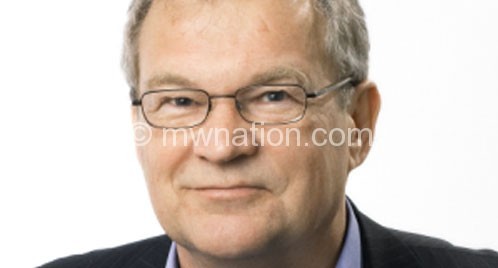Norway envoy dissects Malawi’s growth path

Norwegian Ambassador to Malawi Asbjørn Eidhammer has dissected the country’s development situation, saying policy inconsistency and recurring political crises have dragged it down as other African economies surge.
As such, said Eidhammer, Malawi will still need donor aid for a long time—a position consistent with what Britain’s Department for International Development chief in Malawi Sarah Sanyahumbi and European Union Head of Mission Alexander Baum presented to Nation on Sunday last month that Capital Hill’s recent push for a so-called zero-aid budget was unrealistic because Lilongwe cannot afford donor exclusion.
In an interview last week, Eidhammer observed that Malawi’s economic development over the last 50 years has been disappointing.
He said while the problem of failure to grow economies in the past has been synonymous with all African countries, Malawi has been lagging behind while other countries are achieving sustained economic growth.
“That is something Malawi has in common with most of the African countries. It is only in recent years that many of the countries on the continent have been able to achieve sustained economic growth. Malawi is still lagging behind in this respect.
“There are several reasons for that. The most fundamental are historic and geographical, the more recent are the result of lack of consistency in economic policies and recurring political crises,” he said.
On the current debate that Malawi must wean itself from donor dependence due to donor unpredictability, Eidhammer said Norway has no plan to withdraw from Malawi, saying: “We are not walking away.”
He said much of the debate on aid issues was based on a misunderstanding of the role of partners in Malawi and the nature of the support.
Eidhammer said a prime task of any government in Malawi will be to increase the gross national product (GNP) to make the cake bigger.
“A policy for growth is essential. To achieve growth there is need for a production friendly environment and a stable and predictable economic policy. I believe Malawi is on its way towards such a policy. And the opening up of the country through the new railway to the Indian Ocean and the prospects of increased power production offer opportunities that have not been there before,” he said.
In a separate interview, long time debt relief and development campaigner Collins Magalasi said the key to economic growth for Malawi lays solely in the hands of government, saying the country’s legal and institutional framework favours importing and frustrate direct investment.
“Government sets the business environment [to boost supply] and empower citizens and improve their purchasing power [to boost demand]. At the moment, our governments have incentivised importing at the expense of exporting,” he observed.
Magalasi, who is executive director for African Forum and Network for Debt and Development (Afrodad) based in Zimbabwe, said Malawi has a large import elasticity which reveals a low marginal propensity to invest.





